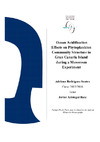Identificador persistente para citar o vincular este elemento:
https://accedacris.ulpgc.es/jspui/handle/10553/74558
| Campo DC | Valor | idioma |
|---|---|---|
| dc.contributor.advisor | Arístegui Ruiz, Javier | - |
| dc.contributor.author | Rodríguez Santos, Adriana | - |
| dc.date.accessioned | 2020-09-23T11:39:54Z | - |
| dc.date.available | 2020-09-23T11:39:54Z | - |
| dc.date.issued | 2016 | - |
| dc.identifier.other | Gestión académica | - |
| dc.identifier.uri | https://accedacris.ulpgc.es/handle/10553/74558 | - |
| dc.description.abstract | The regulation of marine carbon cycling and ocean-atmosphere CO2 exchange is closely related to phytoplankton dynamics. The large increase of atmospheric CO2 levels since the industrial revolution has caused important changes in surface ocean pH and carbonate chemistry. Such changes have been shown to slow down calcification in corals and coralline macroalgae and change competition between phytoplankton groups. Here we investigated whether plankton community structure and net growth rates of phytoplankton groups are affected by pH changes along a pCO2 gradient simulating oligotrophic or eutrophic ocean conditions. The present experiment was performed over 3 March to 3 April 2016 in the eastern coast of Gran Canary island (27º59’22.8” N, - 15º22’0.8” Wº) on seven different mesocosms. Our results show how on oligotrophic conditions nanoeukaryotes and dinoflagellates had a positive response to pCO2 increases, while no significant responses were observed on the other phytoplankton groups. Conversely, on high nutrient concentrations, heterotrophic bacteria and diatoms show a positive response on their net growth rates as pCO2 increased, while picoeukaryotes and flagellates presented a negative response. The main changes in the structure of the phytoplankton community occurred at a CO2 threshold of 700-850 ppm. Our data suggest that the combination of an increase in atmospheric CO2 concentrations together with nutrient fertilization would favour the presence of large diatoms and hence the vertical carbon flux in the ocean. | - |
| dc.language | eng | - |
| dc.relation | KOSMOS 2016 | - |
| dc.subject | 251001 Oceanografía biológica | - |
| dc.subject.other | Plankton | - |
| dc.subject.other | Ocean acidification | - |
| dc.subject.other | Canary Islands | - |
| dc.title | Ocean acidification effects on phytoplankton community structure in Gran Canaria Island during a mesocosm experiment | - |
| dc.type | info:eu-repo/semantics/masterThesis | - |
| dc.type | MasterThesis | - |
| dc.contributor.departamento | Departamento de Biología | - |
| dc.contributor.facultad | Facultad de Ciencias del Mar | - |
| dc.investigacion | Ciencias | - |
| dc.type2 | Trabajo final de máster | - |
| dc.description.notas | Máster Universitario en Oceanografía ; 2015-2016 | - |
| dc.utils.revision | Sí | - |
| dc.identifier.matricula | TFT-37637 | - |
| dc.identifier.ulpgc | Sí | - |
| dc.contributor.buulpgc | BU-BAS | - |
| dc.contributor.titulacion | Máster Universitario en Oceanografía | - |
| item.fulltext | Con texto completo | - |
| item.grantfulltext | open | - |
| crisitem.advisor.dept | GIR IOCAG: Oceanografía Biológica y Algología Aplicada | - |
| crisitem.advisor.dept | IU de Oceanografía y Cambio Global | - |
| crisitem.advisor.dept | Departamento de Biología | - |
| Colección: | Trabajo final de máster | |
Visitas
85
actualizado el 11-ene-2026
Descargas
61
actualizado el 11-ene-2026
Google ScholarTM
Verifica
Comparte
Exporta metadatos
Los elementos en ULPGC accedaCRIS están protegidos por derechos de autor con todos los derechos reservados, a menos que se indique lo contrario.
